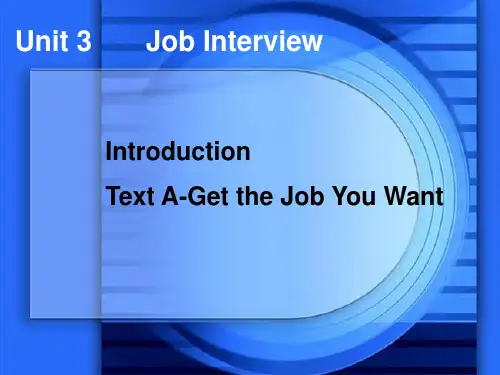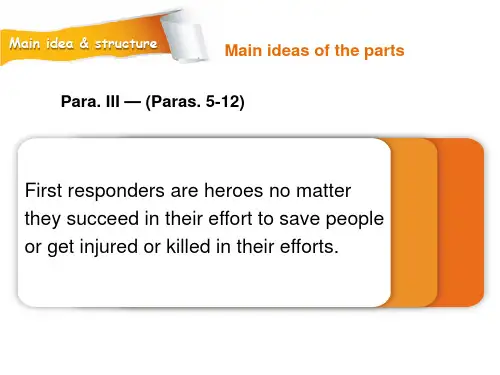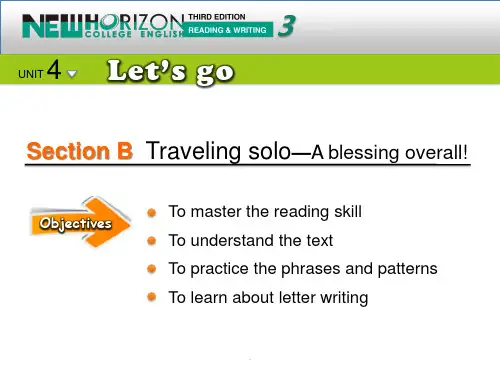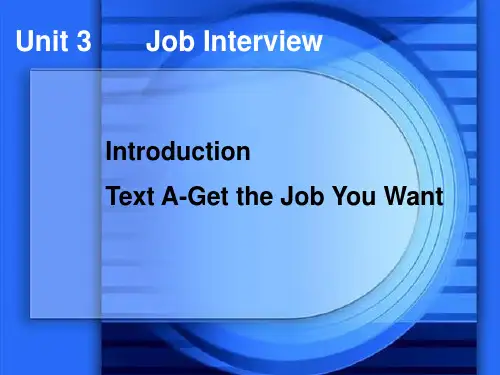新视野大学英语综合教程4Unit3课件
- 格式:ppt
- 大小:1.50 MB
- 文档页数:21











Unit 1 book 4The Temptation of a Respectable WomanPeriod:2 periodsT eaching Objectives:1.Words, Phrases and Expressions of the Text ( stress on the word-formation, and the usage ofthe phrases and the expressions).2.Sentence Structure ( the usage of “might have done or could have done”; and “So +Subject+V or So + V +Subject”).3.Text Structure (story-writing in chronological order).T eaching Procedure:A. Pre-reading Activity(10minutes)What does it mean by the word “temptation” and “respectable”? What does it mean by the title “The Temptation of a Respectable Woman”? (Group work)B. While-reading Activity1.Ask students some sign post questions to each paragraph to see how well the studentsunderstand each paragraph. (Some of the questions are on P.8 Comprehension of the text)nguage Points: (refer to teachers’ book)1). Mrs. Baroda was a little annoyed to learn…Please note that “ annoyed: is modified by “ a little”. “ annoyed” can also be modified by other adverbs, like “ somewhat/ very/ a bit/ pretty/ much/rather/ quite”, etc.e.g. I was a bit annoyed, for I forgot to put your name on .2). … she could understand him no better than at first.Here “ no” mans “not at all”, and can be used as an adverb before comparatives.e.g. The exam is no more difficult than the tests you’ve been doing in class.3). … she imposed her company upon him,…impose one’s company/oneself/upon/on sb.; force one’s company or oneself on sb.e.g. Don’t impose your company/yourself on people who don’t like you.4)“ Y ou are full of surprises,” he said to her.Be full of surprises: do unexpected thingse.g. She’s always full of surprises.6). … the last thing he would desire or expect.The last thing: ( 1). sth. that is desired in the leaste.g. The last thing he needed right then was more bad news about his son.(2) sth. that is taken as the last onee.g. My feeling was that if this was the last thing I was going to do, I wanted to be ofsome value.7). But the poor fellow is run dow n by too much work now.Run down: (cause to) decline in physical condition; weaken or exhaust in mind or vigore.g. His health ran down to a dangerous level.…made some routine observations upon the unhealthy effect…8). …. A meaningless succession of verbs nouns, adverbs and adjectives…a succession of: a number of people or things following each other closelye.g. The reason is that a succession of statistics suggest a rapidly weakening economy.9). She wanted reach out her hand in the darkness and touch him ___ which she mighthave done if she had not been a respectable woman.Note the structure “might have done: is used to say that if a particular thing had happened, then there was a possibility of something else happening. The structure “could have done” can also be used in this way.e.g. She said it might have been all right, if the weather had been good.He could have got tickets if he had arrived there earlier.10). But she did not yield to the temptation.Yield to: give in to; decide to do sth. because one cannot resist the temptation.e.g. Plenty of mysteries have lasted for centuries and finally yielded to explanation.11). … she was also a very sensible one.sensible: reasonable, practical and able to judge things welle.g. I think it’s a very sensible suggestion.Compare: sensitive: (of people) easily upset, esp. by things that are said or done; (of things) causing people to be upset or producing a difficult or embarrassing situatione.g. Her reply showed that she was very sensitive to criticism.12). …truly he did not deserve it.Deserve:(not used in the progressive tenses) if sb,/sth. deserves sth., it is right that they should have it, because of the way they have behaved or because of what they aree.g. The report deserves careful consideration.One player in particular deserves a mention.He deserves to be locked up forever for what he did.C. Post-reading Activity1.Ask students to sum up the main idea of the text and to analyze the writing techniques of thetext.Text Structure AnalysisWriting in chronological order is common in narrative, where events are presented according to time sequence. This kind of writing is much used in telling stories, in brief biographical and autobiographical sketches. This reading passage is made up of several episodes arranged according to time sequence even though the author employs many different writing techniques, especially cause-and-effect in developing the episodes. Look at the following chart and you will find that the story is structured according to time sequence as a whole. 1. The first part o f the passage is Paragraph 1, which is the general situation of the story and also the starting point of the story. Mrs. Baroda was a little annoyed that her husband’s friend, Gouvernail, was to spend a week or two on their plantation. 2. The second part consists of 9 paragraphs, from Paragraph 2 to Paragraph 10, telling us what happened and informing us about Mrs. Baroda's impressions of her guest — Gouvernail. The descriptions are presented in chronological order. Paragraph 2 deals with Mrs. Baroda’s impression of her guest — she was feeling puzzled, not being able to penetrate her silent guest. Paragraphs 3 to 10 are about a conversation between Mr. and Mrs. Baroda concerning their guest —Gouvernail. Mrs. Baroda was troubled to find Gouvernail a terrible nuisance — not a man of wit, but a dull man difficult to understand. Time markers: after a few days, then, one day, in the morning, until, etc. 3. The third part is made up of 9 paragraphs,from Paragraph 11 to Paragraph 19, concentrating on what happened “that night”. The author uses a succession of verbs and adverbs to describe what happened that night in chronological order. In this part, the author also describes some sort of emotional change in Mrs. Baroda but all this came along with a succession of actions. Time markers: that night, the next morning, then, when, etc. 4. The fourth part is Paragraph 20 only. Paragraph 20 is about what happened the day after “that night”. The next morning, Mrs. Baroda took an e arly train without even saying farewell. She did not return until Gouvernail was gone. Time markers: the next morning, not return until 5. The fifth part is Paragraph 21. Paragraph 21 describes what happened during the time after “that night”. Durin g the summer that followed, Mr. Baroda greatly desired that his friend should come to visit them again but this was vigorously opposed by Mrs. Baroda. Time marker: during the summer that followed 6. The sixth part consists of Paragraph 22 to Paragraph 24, which is the continuing part of the story, still, according to time sequence. Before the year ended, Mrs. Baroda proposed to have Gouvernail visit them again as she had overcome everything. Time marker: before the year ended2.Homework: Learn the words and phrases by heart and next week there will be a dictation; Do all the exercises on the book with translation done on the exercise book.(2)Period:2 periodsT eaching Material:New Horizon College EnglishT eaching Procedure:1.Dictation of the words and phrasesment on and appraise the exercises.3.Reading Skills (Section B) The Obligations and Responsibilities to MarriageReading between the lines: using context clues, common sense and your knowledgeof the world to guess the possible answers to the questions between the paragraphs.1)Introduction of the skill (P. 16)2)Reading the samples ( P. 16)3)Practice the skill and (P.17)4)Doing the exercise on it (P.23)Note:There are three levels among the students. The students are given the tasks in terms of their levels.Unit 2, book 4Charlie Chaplin (Section A )Period:2 periodsT eaching Objectives:The students will be able to:T eaching Objectives1.Words, Phrases and Expressions of the Text ( stress on the word-formation, and theusage of the phrases and the expressions).2.Sentence Structure ( a: inversion of the sentence; b: It is + adj. to do…).3.Text Structure (a central topic/idea supported by different aspects/details).T eaching Procedure:A. Pre-reading Activity(10minutes)What do you know about Charlie Chaplin?What do you want to know about Charlie Chaplin? (Pair work)B. While-reading Activity1Ask students some sign post questions to each paragraph to see how well the students understand each paragraph and train Ss skimming ability. (Some of the questions are on P.37 Comprehension of the text)2Language Points: (refer to teachers’ book)1). cut down: reduce the size of (sth. such as clothing, writing, etc.)e.g.I could cut your father's trousers down for the boy.Y our article will have to be cut down to fit into the book.They've cut her hours down at work so she doesn't have much money.If an article is too long for the space allocated, you have to cut it down.2). . for good: permanently; forevere.g.This time she's leaving for good. 这一次她将是永远地离开了。